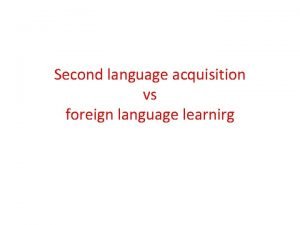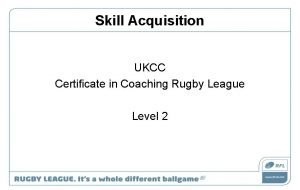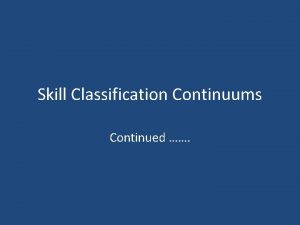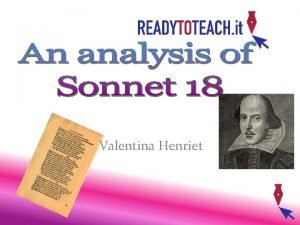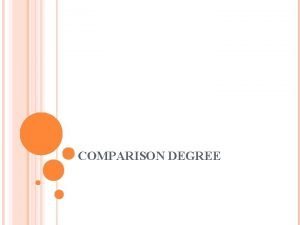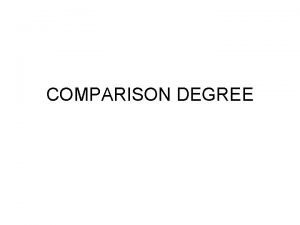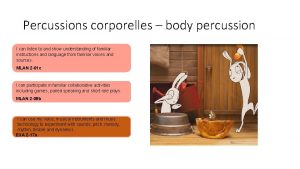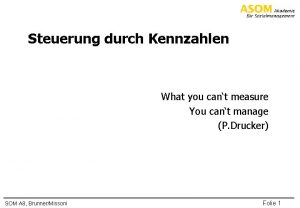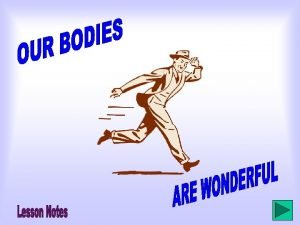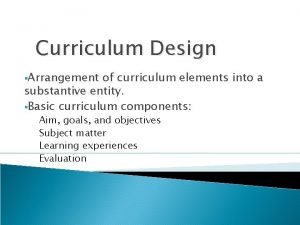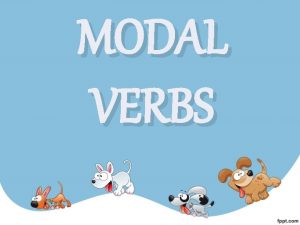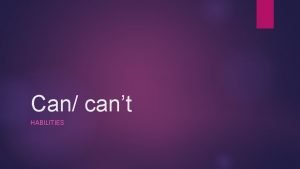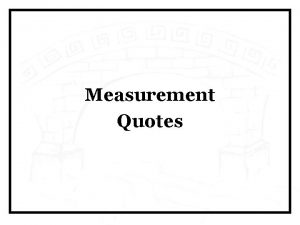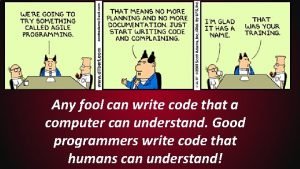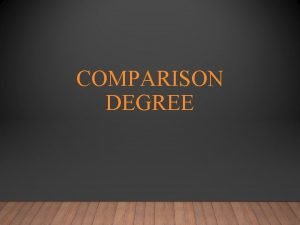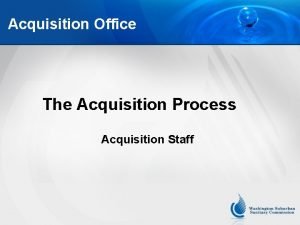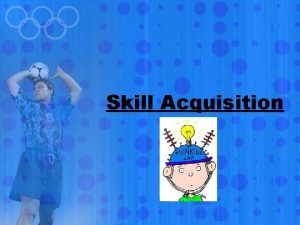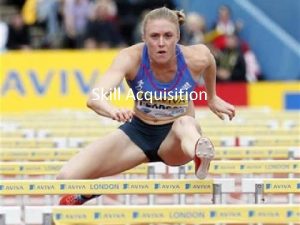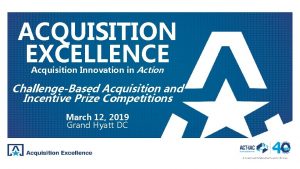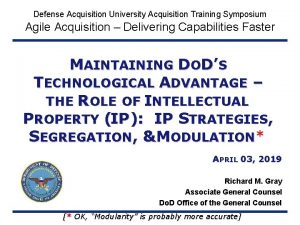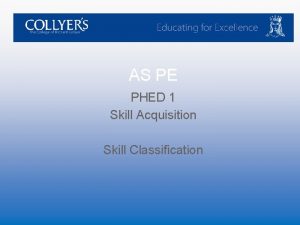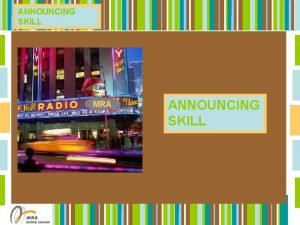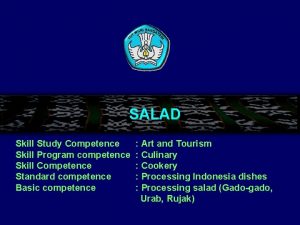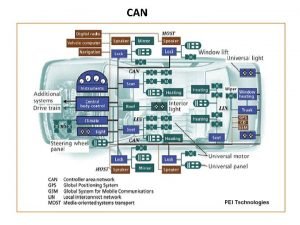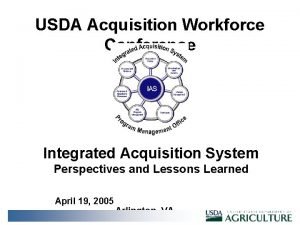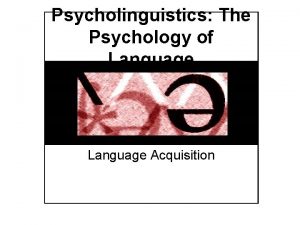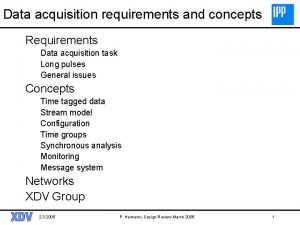ACQUISITION OF SKILL What is skill We can





















- Slides: 21

ACQUISITION OF SKILL

What is skill? � We can simply definite it as an act or a task � To succeed efficientely and effectively in a particular task we use our knowledge or experise � In PE we say that a skill is the ability to perform activities or movements with control and consistency to bring about a desired result.

Basic vs Complex skills �A skill can be basic or complex depending on the type of activity undertaken

Basic Skills These are skills such as throwing, catching and striking � Control of body movement or co-ordination is a key requirment for mastering these skills � Body movement needs to be fully controlled to perform the skill correctly � Although throwing is considered a basic skill it is still very complicated as there needs to be coordination between the arms, the hands and the brainnin order to achieve an accurate throw. �

Complex Skills � These are skills such as Pole vault, High Jump and Long Jump � They are called complex as it takes a long time to learn because of the high level of coordination and control needed � The high jump for example requires a combination of skilled movements for run up, take off, flight and landing to complete a successful jump

Practice We can learn new things such as skills only through practice � As sportsman we listen a lot the phrase “ practice makes perfect” � It is important to practise repeatedly a particular activity to make progress and improve in it � Through training even top level performers continue to practise and improve skills already learned and start from the basic skills before moving to more complex ones. �

PE Lessons � Sessions start with a warm-up � Follwed is the skill practice which is related to the partuclar activity students are about to do � Sessions must be well organized so that the skills learned and practiced will become useful

Warm-up Important before the start of any physical activity and should not be ignored in a practice session � It helps to avoid injuries as the body will be fully prepared for that day’s session � It includes: Stretching and flexibility exercises including some more energetic exercises � These are aimed to increase the heart rate and body temperature also known as pulse raisers �

Skill Practice Involve practising particular skills during an activity They can be: -Individual Skills like a tennis player practising the serve -Group Skills like training a short corner in hockey � In a team game activity it is a good idea to use both the skills to be prepared to use them in a game � Static Opponents or Active Opposition can aslo be used and combined in skill practice which are very useful to use in a practice session. � �

Game Situation � The session should finish with a game situation to try out the skills that have been practised � This may not be an actual game but a conditioned game is more useful to be used so as to improve performance � This is a game where some adaptations are introduced which can make it easier or harder to play

Frequency of Practice The amount a person practises depend on how seriously they take their sport and at what level they play � A professional practise every day for several hours a day while an amateur may only practise for a few days a week for a total of a few hours � Practise is not only done in the sport itself but also work on fitness is needed for a player. This is to ensure that they remain in form �

Drills � We repeat them a lot in practice � An example is the lay-up technique in basketball where a player dribble in, steps and shoot at the basket � As we repeat them a lot performers can get to a level of grooved performance where by the practice done the drill comes almost automatically to do and do it correctly

What should be practised? � The content of a practise session is clearly very important and it will vary between different performaers and activities � Constantly practising a particular skill there will be reinforcment � But a performer can experience different effects when skills are being practised

The Effects Negative acceleration – A new skill is learnt quickly, than progress slows down � Positive acceleration – Learning a skill is difficult at first but than progress quickens � Linear progress – Progress is fairly level and constant � Plateauing – A performer appears to stuck at a certain level and cannot progress beyond it for some time. When this happens skills need to be broken down and work more on them. This may also be the reason why some performers give up. �

Applying skills � Learning or acquiring a skill is one thing but using that skill at the right time and at the right way is another � This is what makes top performers successful. They know how to apply those skills they possess to win � Many skills are similiar in different activities and infact transfer of skills can take place.

Open and Closed Skills Open Skills show up in situations that are constantly changing. Example footballers in a match are in constantly changing environment and have to change the way they play sometimes. � Closed Skills on the other hand are skills that have a set pattern and are in an environment that does not change. Example a trampolinist performs using always the same equipment when doing somersaults. � There also those skills which fall in between and may have an element of each or are neither fully open or closed. �

Feedback � In order to improve a skill performers need to be judged on how well they performed. This can be done by a teacher/coach or also by the performers themselves. Doing something successful is not enough but also how it was performed is very important and ways of improving it are given.

Different Types of Feedback � � � � Continous Feedback – the performer is recieving information of how it is going during the performance itself. Terminal Feedback – feedback given at the end of the performance Knowledge of results – is a way of terminal feedback where the performer knows the final results Knowledge of performance – this concerns how well the performance was done not just the ending result Internal/Intrinsic Feedback – the way the performer feels himself while performing External/Exrtinsic Feedback – sources such as sounds which come out from sources other than the performer Positive Feedback – information recieved regarding success in the performance Negative Feedback – information about unsuccessful aspects of the performance

Types of Guidance Performers recieve guidance mostly from their teacher or coach and it is one of the main ways he/she recieves their knowledge of results. � It is very difficult for the performer to judge himself while performing and this is why nearly all top performers have a coach who works with them all the time. In the early stages when a skill is being learned a coach can help a lot and comment on how to improve. � This role has many responsabilities and finding ourselves in this role we need to be aware on how we give our tips and help. �

Goal Setting When recieving feedback, that information given is used for further goal setting � After analysing a practice session or a performance targets are set for the performer himself � Important points when giving goal setting: be realestic with the goal sets, you are acting on accurate information you saw, you are setting goals as without them it’s difficult to make significant progress and that you need time to move from one stage to another �

Mental Rehearsal � This technique has become an important part of skill aquisitionas seen by the performer and coaches � Before actually taking part in the performance, performers spend some time going through the performance in their mind � It makes you better prepared and can also improve your confidence for the event
 Second language vs foreign language
Second language vs foreign language Skill acquisition certificate
Skill acquisition certificate Skill acquisition continuum
Skill acquisition continuum Hard skills vs soft skills
Hard skills vs soft skills If you cannot measure it you cannot manage it
If you cannot measure it you cannot manage it Sonnet 18 figures of speech
Sonnet 18 figures of speech How to be more impressive 1+1=2
How to be more impressive 1+1=2 You can tell harris about it just ____(easily) as i can
You can tell harris about it just ____(easily) as i can You can t improve what you don t measure
You can t improve what you don t measure Can can body percussion
Can can body percussion Finanzkennzahlen
Finanzkennzahlen I can could speak english
I can could speak english If you think you can you can poem
If you think you can you can poem Already can or can already
Already can or can already The arrangement of elements of curriculum is
The arrangement of elements of curriculum is Express ability and inability
Express ability and inability Dr. jean bear hunt
Dr. jean bear hunt Look at the pictures and complete with can or can't
Look at the pictures and complete with can or can't Quotes on measurement
Quotes on measurement Any fool can write code that a computer can understand
Any fool can write code that a computer can understand You can tell harris about it just ____(easily) as i can.
You can tell harris about it just ____(easily) as i can. If you can imagine it you can achieve it
If you can imagine it you can achieve it
